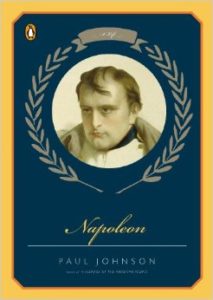 Mrs. T and I just watched Conquest, a delicious 1937 movie in which Charles Boyer and Greta Garbo played Napoleon Bonaparte and the Countess Marie Walewska. Seeing Conquest reminded me that I reviewed two books about Napoleon—the only time I’ve ever had occasion to write about him—for the now-defunct Book Magazine in 2002. None of the dozen-odd pieces I wrote for Book has ever been reprinted, so I thought I’d post this one, which I like very much.
Mrs. T and I just watched Conquest, a delicious 1937 movie in which Charles Boyer and Greta Garbo played Napoleon Bonaparte and the Countess Marie Walewska. Seeing Conquest reminded me that I reviewed two books about Napoleon—the only time I’ve ever had occasion to write about him—for the now-defunct Book Magazine in 2002. None of the dozen-odd pieces I wrote for Book has ever been reprinted, so I thought I’d post this one, which I like very much.
* * *
One of the persistent legends of the publishing business is that you can always make a fast buck by bringing out a new biography of Jesus Christ, Abraham Lincoln—or Napoleon Bonaparte. That may have been true a half-century ago, but what about now? Granted, Napoleon is one of the few nineteenth-century European rulers about whom ordinary Americans know anything at all. Most of us vaguely recall that he was short (five foot five) and had a wife named Josephine (or was she his mistress?), and a smaller number are probably aware that he fought a battle at a place called Waterloo (but where was it?). But that’s about it, really, a handful of Trivial Pursuit questions with which to sum up the crowded life of the violent titan who shut down the French Revolution, crowned himself Emperor of France, fought a long string of battles that brought him within arm’s length of controlling all of Europe, overreached himself by vainly trying to conquer Russia, and ended his days in impotent exile on the tiny island of St. Helena, wondering to the last how it all went so terribly wrong.
 For those seeking to fill in the blanks, Paul Johnson, the opinionated author of such supremely readable works of popular history as Modern Times and A History of the American People, has contributed a study of Napoleon to the Penguin Lives series of short biographies. The premise of these tasty little volumes is that it ought to be possible to sum up the life of a famous person in 200 pages or less. Seeing as how Johnson specializes in really, really long books, I wondered at first whether he was the best choice for the job, but within a few pages I knew that Napoleon is a near-perfect model of what a brief life can and should be: crisp, clear, concise and strongly personal.
For those seeking to fill in the blanks, Paul Johnson, the opinionated author of such supremely readable works of popular history as Modern Times and A History of the American People, has contributed a study of Napoleon to the Penguin Lives series of short biographies. The premise of these tasty little volumes is that it ought to be possible to sum up the life of a famous person in 200 pages or less. Seeing as how Johnson specializes in really, really long books, I wondered at first whether he was the best choice for the job, but within a few pages I knew that Napoleon is a near-perfect model of what a brief life can and should be: crisp, clear, concise and strongly personal.
In order to write a good short biography, you have to start with an unambiguous point of view. Nobody has ever accused Paul Johnson of being equivocal, and Napoleon leaves no possible doubt of his low opinion of the most famous general in history. As a good old-fashioned France-hating Catholic conservative, it stands to reason that Johnson would disapprove of the man who turned Europe inside out in his mad quest for power, but his book is more than just an attack on Napoleon himself: it is also a cautionary tale. For Johnson, Napoleon’s greatest significance is his influence on the dictators who came after him. “The totalitarian state of the twentieth century,” he writes, “was the ultimate progeny of the Napoleonic reality and myth….the great evils of Bonapartism—the deification of force and war, the all-powerful centralized state, the use of cultural propaganda to apotheosize the autocrat, the marshaling of entire peoples in the pursuit of personal and ideological power—came to hateful maturity only in the twentieth century, which will go down in history as the Age of Infamy.” That is the story he tells in Napoleon, and he tells it with the venomous simplicity of an obituary writer who has been waiting patiently to get the last word.
Once you’ve finished NapoleonNapoleon: A Biography, which he sniffishly dismisses in his bibliography as “pro-Napoleon,” though I can’t see why. Originally published in England five years ago, McLynn’s book is for the most part as harshly critical of its subject as Johnson’s: in it, he portrays Napoleon as “a secretive, unscrupulous, duplicitous and chillingly ambitious personality….He viewed human beings as despicable creatures, fuelled by banality and led by clichés.” If that’s pro-Napoleon, I shudder to think what McLynn would write about somebody he didn’t like.
 For my part, I found Napoleon: A Biography to be both solidly written and seemingly balanced. A professional biographer and part-time academic, McLynn devotes rather too much space to amateur psychoanalysis (I can’t remember the last time I read a book that quoted Wilhelm Reich with a straight face). Fortunately, it’s easy enough to skip over the bits about mother complexes and stick to the good stuff, of which there is plenty, including a generous helping of characteristically brutal quotations from the man himself: “If the people refuse what makes for their own welfare they are guilty of anarchism and the first duty for the prince is to punish them.”
For my part, I found Napoleon: A Biography to be both solidly written and seemingly balanced. A professional biographer and part-time academic, McLynn devotes rather too much space to amateur psychoanalysis (I can’t remember the last time I read a book that quoted Wilhelm Reich with a straight face). Fortunately, it’s easy enough to skip over the bits about mother complexes and stick to the good stuff, of which there is plenty, including a generous helping of characteristically brutal quotations from the man himself: “If the people refuse what makes for their own welfare they are guilty of anarchism and the first duty for the prince is to punish them.”
Napoleon on the battlefield, Napoleon in the bedroom, Napoleon in spectacular triumph and shameful defeat—McLynn shows us all the countless Napoleons in all their inexplicable inconsistency, though neither he nor Johnson comes close to supplying a definitive answer to the impossible question with which everyone who writes about Napoleon Bonaparte must eventually grapple. How could a misanthropic, sexually uncertain boy from Corsica have contrived to become the most powerful man in Europe by the age of 35? What was the source of his evil genius? The only possible answer was given by Androche Junot, his chief aide: “He is the sort of man of whom Nature is sparing and who only appears on earth at intervals of centuries.” To which the only possible reply is: Thank God they don’t come along any more often than that.
* * *
A scene from Conquest:

 CLOSING SOON IN TYSON, VA.:
CLOSING SOON IN TYSON, VA.: